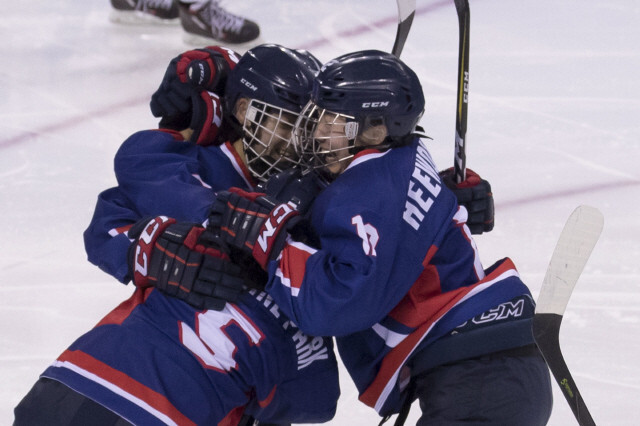hankyoreh
Links to other country sites 다른 나라 사이트 링크
Unification Ministry says “May 24 measures” or Lee Myung-bak administration are no longer relevant

On May 20, Ministry of Unification (MOU) Spokesperson Yoh Sang-key said that the “May 24 measures” have “effectively lost much of their efficacy.”
“The government no longer views the May 24 measures as an obstacle to pursuing inter-Korean exchange and cooperation,” he added. The term “May 24 measures” refers to independent sanctions on North Korea imposed by the Lee Myung-bak administration on May 24, 2010, two months after the sinking of the ROKS Cheonan on Mar. 26 of that year. This year marks their 10th anniversary.
Speaking in a regular briefing on May 20, Yoh explained that the May 24 measures have “undergone greater flexibility and exceptions over the course of several administrations.”
“Going forward, the administration will continue its efforts to broaden the space for inter-Korean relations and establish real peace on the Korean Peninsula,” he continued.
The content of the May 24 measures chiefly included a suspension of inter-Korean economic cooperation and trade projects apart from the Kaesong Industrial Complex; prohibitions on visiting North Korea outside of the Kaesong Complex and Mt. Keumgang; a ban on the operation of North Korean vessels in South Korean waters; a ban on new investment in North Korea; and the suspension of North Korea support efforts apart from humanitarian aid.
But in September 2011, the same Lee administration that had implemented the May 24 measures approved North Korea visits for representatives of seven major religious orders. The “flexibility measures” continued to increase under the Park Geun-hye and Moon Jae-in administration, leaving the measures more or less nullified. Exceptions to the measures have been broadened to various inter-Korean exchange and cooperation efforts, including approval of a trilateral distribution cooperation project for the Rajin-Hasan area under the Park administration in November 2013, as well as approval of the use of the Man Gyong Bong passenger ferry by a North Korean artistic group visiting South Korea for the Pyeongchang Winter Olympics under the Moon administration in February 2018.
By Lee Je-hun, senior staff writer
Please direct comments or questions to [english@hani.co.kr]

Editorial・opinion
![[Column] Has Korea, too, crossed the Rubicon on China? [Column] Has Korea, too, crossed the Rubicon on China?](https://flexible.img.hani.co.kr/flexible/normal/500/300/imgdb/original/2024/0419/9317135153409185.jpg) [Column] Has Korea, too, crossed the Rubicon on China?
[Column] Has Korea, too, crossed the Rubicon on China?![[Correspondent’s column] In Japan’s alliance with US, echoes of its past alliances with UK [Correspondent’s column] In Japan’s alliance with US, echoes of its past alliances with UK](https://flexible.img.hani.co.kr/flexible/normal/500/300/imgdb/original/2024/0419/2317135166563519.jpg) [Correspondent’s column] In Japan’s alliance with US, echoes of its past alliances with UK
[Correspondent’s column] In Japan’s alliance with US, echoes of its past alliances with UK- [Editorial] Does Yoon think the Korean public is wrong?
- [Editorial] As it bolsters its alliance with US, Japan must be accountable for past
- [Guest essay] Amending the Constitution is Yoon’s key to leaving office in public’s good graces
- [Editorial] 10 years on, lessons of Sewol tragedy must never be forgotten
- [Column] A death blow to Korea’s prosecutor politics
- [Correspondent’s column] The US and the end of Japanese pacifism
- [Guest essay] How Korea turned its trainee doctors into monsters
- [Guest essay] As someone who helped forge Seoul-Moscow ties, their status today troubles me
Most viewed articles
- 1[Column] The clock is ticking for Korea’s first lady
- 2Samsung barricades office as unionized workers strike for better conditions
- 3After 2 months of delayed, denied medical care, Koreans worry worst may be yet to come
- 4[Correspondent’s column] In Japan’s alliance with US, echoes of its past alliances with UK
- 5[Column] Has Korea, too, crossed the Rubicon on China?
- 6Hong Se-hwa, voice for tolerance whose memoir of exile touched a chord, dies at 76
- 7All eyes on Xiaomi after it pulls off EV that Apple couldn’t
- 8US overtakes China as Korea’s top export market, prompting trade sanction jitters
- 9[Photo] Smile ambassador, you’re on camera
- 10[Guest essay] How Korea turned its trainee doctors into monsters